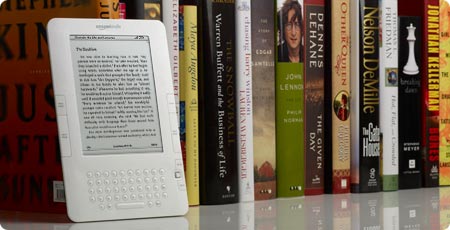Six Weeks With an Amazon Kindle 2
I bought an Amazon Kindle 2 International Version back in October this year, and I'm pretty pleased with how it's turned out. It's been an interesting playing with the device and reading some books through it, so I thought I'd do a quick posting on how it's worked out and how relevant it is to Oracle developers.

I'm based in the UK and so I had to wait until now to buy a Kindle, as up until recently it's only been available in the USA. Amazon recently made it available for sale in quite a few English-speaking countries, with the Whispernet service that allows you to wirelessly download books now extended to 100 countries. It cost me about £180 or so and books are about the same cost as buying them in paper form (you have to buy through Amazon.com, and whilst prices are cheaper they have to add VAT on, as UK VAT is only waived for printed books).
From a usability perspective, it's great. The size is about that of a paperback book, but it's thinner and lighter so you can slip it into your jacket pocket or into your laptop back or rucksack. The design of the section generation Kindle is better than the first one, there's a full keyboard and the device uses e-ink, which stays displayed with no power consumption (or very little). Battery life if you leave the 3G Whispernet connection off is a couple of weeks, with the connection it's about five days, which is enough for most trips abroad for work.
Navigation around a book is through back-and-forward buttons, whilst some books have clickable tables of contents (though not all, which is a problem when you've got a reference book). I've found that the medium works best for linear books such as novels, as opposed to ones that you'd flick around like reference or technical books - some books don't have clickable tables of contents as I said, and even those that do are difficult to "randomly access" as you can't quickly scan through a chapter, page refresh is a bit slow and so on. As I said, novels work well, particularly as the last page you read is always remembered which makes picking up a novel after a break very easy.
I did try a newspaper subscription (The Independent), but the layout for these is very textual, very linear, nothing like a newspaper experience, so I cancelled during the free subscription period. For novels though (plus technical books that can be read start-to-finish) the Kindle has completely taken over from printed books for me, particularly as you can buy a new book and have it instantly downloaded over Whispernet in a couple of minutes.
From an Oracle perspective, a surprising number of technical books are available for the Kindle. I bought Jonathan Lewis' "Cost-Based Oracle Fundamentals", for example, which does have a table of contents and actually works well on the format as it's readable in a linear way but handy to have as a reference. Quite a few of the Apress and Oracle Press books are available on the Kindle, but watch out for pricing - Edward Roske and Tracey McMullen's "Look Smarter Than You Are with Essbase 11: An Administrator's Guide" is listed on Amazon.com as $46.81 for the paperback version, but $71.24 for the Kindle version, which I think includes a surcharge due to the size of the book and the amount of Whispernet bandwidth it takes up (I'm guessing). Certainly given the electronic, non-physical aspect of the purchase I'd expect Kindle books to be about half the price of the printed version, in reality they are about the same price, perhaps slightly more, and there's the VAT aspect that I mentioned that applies when you purchase from the UK.
So, in summary, I'm really pleased by the Kindle and it's my exclusive way of reading novels (which gets a few strange looks from people on the train, as there aren't many Kindles over here at the moment). For technical books, I still prefer a PDF on my laptop, but I'd ideally like to have these on the Kindle as well once they become more usable. I'm also keen to see what Apple come up with, with the rumoured Apple Tablet, as the Kindle is certainly very black-and-white, not a multi-media device, whereas the Tablet I'd guess will major on internet browsing and video. Still, for reading books it's pretty good, you forget you're reading from a device after a few hours, and the instant gratification bit of being able to order, and then read, from a list of thousands of books is pretty neat.